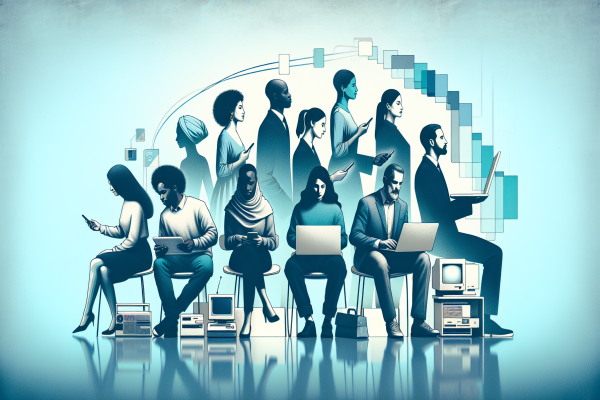
From Payment Processor to $450B Giant: How PayPal Changed How We Send Money
Picture this: It's 1998, and you want to buy something from someone across the country. You have to mail a check, wait for it to arrive, hope it doesn't get lost, and then wait again for it to clear. Sounds crazy, right? That's exactly what frustrated a group of young tech workers in California. Their answer to this problem? A little company called PayPal that would change how the entire world sends and receives money.
Today, PayPal is worth more than $450 billion and moves over $1 trillion in payments every year. But this tech success story started with a much simpler idea: making it easy for people to send money through email. Let's explore how PayPal became one of the greatest tech achievements of our time.
The Birth of a Revolutionary Idea
In 1998, Max Levchin and Peter Thiel started a company called Confinity. They wanted to make sending money between people as easy as sending an email. Around the same time, Elon Musk started X.com, an online bank. Both companies were working on similar problems in Silicon Valley.
The two companies merged in 2000 and eventually became PayPal. This merger brought together some of the smartest tech minds who would later build other famous companies. This group became known as the "PayPal Mafia" because so many went on to create or invest in companies like Tesla, SpaceX, LinkedIn, and YouTube.
What made PayPal different from other payment systems? Three simple things:
- You could send money using just an email address
- It was free for buyers to use
- It worked on any computer with internet access
Growing Through eBay and Beyond
PayPal's first big breakthrough came from an unexpected place: eBay auctions. People buying and selling on eBay needed a safe way to send money to strangers. PayPal solved this problem perfectly.
By 2002, PayPal was processing millions of payments for eBay users every day. eBay noticed this tech breakthrough and bought PayPal for $1.5 billion. This was one of the biggest tech wins of the early internet era.
But the story doesn't end there. Under eBay's ownership, PayPal continued to grow. It expanded to more countries, added new features, and became the payment method of choice for millions of online shoppers. According to a Statista report, PayPal's payment volume grew from $12 billion in 2002 to over $1 trillion by 2021.
Breaking Free and Growing Bigger
In 2015, something interesting happened. eBay and PayPal split apart, becoming two separate companies again. Many people worried this would hurt PayPal. Instead, the opposite happened.
As an independent company, PayPal could work with everyone, not just eBay. This opened up huge opportunities. PayPal started appearing on websites everywhere. Small businesses, large stores, and even individual creators could accept PayPal payments.
This period marked one of the most important tech industry milestones. PayPal showed that digital payments could work for everyone, not just tech-savvy people. Your grandmother could send money as easily as a college student.
Smart Moves in a Changing World
PayPal didn't just sit still after becoming independent. The company made several smart choices that helped it stay ahead:
Buying Venmo
In 2013, PayPal bought a small app called Venmo for $800 million. Venmo made splitting bills and sending money to friends super easy. Young people loved it. Today, Venmo processes over $60 billion in payments each year, according to PayPal's investor reports.
Adding Cryptocurrency
When people started getting excited about Bitcoin and other digital money, PayPal listened. In 2020, PayPal let users buy, sell, and hold cryptocurrency right in their PayPal accounts. This made crypto accessible to millions of regular people who found it too confusing before.
Buy Now, Pay Later
PayPal also added "Pay in 4," letting shoppers split purchases into four payments. This feature became hugely popular, especially during tough economic times. It's now one of PayPal's fastest-growing services.
Making Life Easier for Businesses
While PayPal started by helping individuals, it became just as important for businesses. Today, PayPal helps over 30 million businesses get paid, from tiny online shops to major retailers.
What makes PayPal valuable for businesses?
- Easy setup: A business can start accepting payments in minutes
- Customer trust: People feel safe paying with PayPal
- Global reach: Businesses can sell to customers in over 200 countries
- Simple tools: Creating payment buttons and checkout pages requires no coding
A PYMNTS study found that businesses adding PayPal as a payment option saw their sales increase by an average of 15%. This shows how these top tech innovations create real value for businesses.
The Pandemic Acceleration
When COVID-19 changed the world in 2020, PayPal's technology became more important than ever. With stores closed, everyone needed to shop online. PayPal helped make this transition smoother.
During 2020 alone, PayPal added 70 million new users. Small businesses that never sold online before suddenly needed digital payment solutions. PayPal provided simple tools that helped them survive during tough times.
This represents one of the most significant technology success stories of the pandemic era. While many companies struggled, PayPal thrived by helping others adapt to a digital-first world.
Numbers That Tell the Story
Let's look at some amazing numbers that show PayPal's impact:
- 400+ million users: That's more than the population of the United States
- 30+ million merchants: From huge companies to individual creators
- $1+ trillion: Total payment volume processed each year
- 200+ countries: PayPal works almost everywhere on Earth
- 25+ currencies: Making international payments simple
These aren't just big numbers. Each one represents millions of real people who can send money, buy things, or run businesses easier than before. That's what makes this one of the most famous tech stories.
Lessons from PayPal's Success
What can we learn from PayPal's journey? Several important lessons stand out:
Solve Real Problems
PayPal succeeded because it fixed a genuine headache: sending money was slow and complicated. The best technology success stories always start with real problems that affect real people.
Keep Improving
PayPal didn't stop after initial success. The company constantly added new features, bought other companies with good ideas, and adapted to changes. This commitment to improvement kept PayPal relevant for over 20 years.
Make It Simple
Anyone can send money through PayPal, regardless of tech skills. This simplicity made PayPal accessible to billions of people worldwide. The best tech breakthroughs work for everyone, not just experts.
Build Trust
PayPal invested heavily in security and fraud protection. This built trust with users who worried about sending money online. Trust turned out to be just as important as technology.
The Future of Digital Payments
Where is PayPal heading next? The company continues pushing forward with new innovations:
- Artificial Intelligence: Using AI to spot fraud and personalize experiences
- Voice Payments: Working on paying through smart speakers
- Cryptocurrency Expansion: Adding more digital currency options
- Super Apps: Creating all-in-one financial apps for different markets
These developments show that PayPal's story continues to evolve. The company that revolutionized payments 25 years ago is still finding new ways to innovate.
As technology keeps changing how we live and work, companies like RashFlash.ai are building the next generation of tools that make business easier. Just like PayPal simplified payments, new AI solutions are simplifying other business challenges.
Why This Story Matters
PayPal's journey from a small startup to a $450 billion company shows what's possible with the right idea and persistent effort. It's proof that technology can make life genuinely better for billions of people.
Before PayPal, sending money internationally took days and cost a fortune. Now it happens in seconds for minimal fees. Small businesses that couldn't accept credit cards can now compete globally. Friends can split dinner bills instantly. Freelancers can get paid by clients anywhere in the world.
These changes might seem small individually, but together they've transformed how our economy works. That's the mark of one of the greatest tech achievements: when technology becomes so useful that we can't imagine life without it.
The digital revolution success of PayPal inspired countless other companies to build payment solutions. Companies like Stripe, Square, and Cash App all followed PayPal's lead, creating even more options for moving money digitally.
Your Turn to Innovate
PayPal's story teaches us that massive success often starts with noticing everyday problems. The founders simply wanted an easier way to send money. That observation turned into one of the biggest tech wins in history.
What problems do you notice in your daily life? What frustrates you about running your business? Those frustrations might hold the seeds of the next great innovation. Technology keeps advancing, creating new opportunities to build solutions that help millions of people.
Whether you're an entrepreneur dreaming of your own startup, a business owner looking for better tools, or simply someone interested in how technology changes our world, PayPal's story offers inspiration. It proves that smart ideas, combined with hard work and the right timing, can truly change the world.
As we continue through the digital age, payment technology will keep evolving. New players will emerge, bringing fresh ideas and innovations. But PayPal's transformation from a tiny startup to a global giant will remain one of the most inspiring technology success stories of our time.
Want to stay ahead of technological change in your business? Explore how artificial intelligence and modern tools can solve your business challenges at RashFlash.ai. Just like PayPal revolutionized payments, today's AI innovations are revolutionizing business operations, customer service, and growth strategies. The future belongs to those who embrace these powerful new tools.

